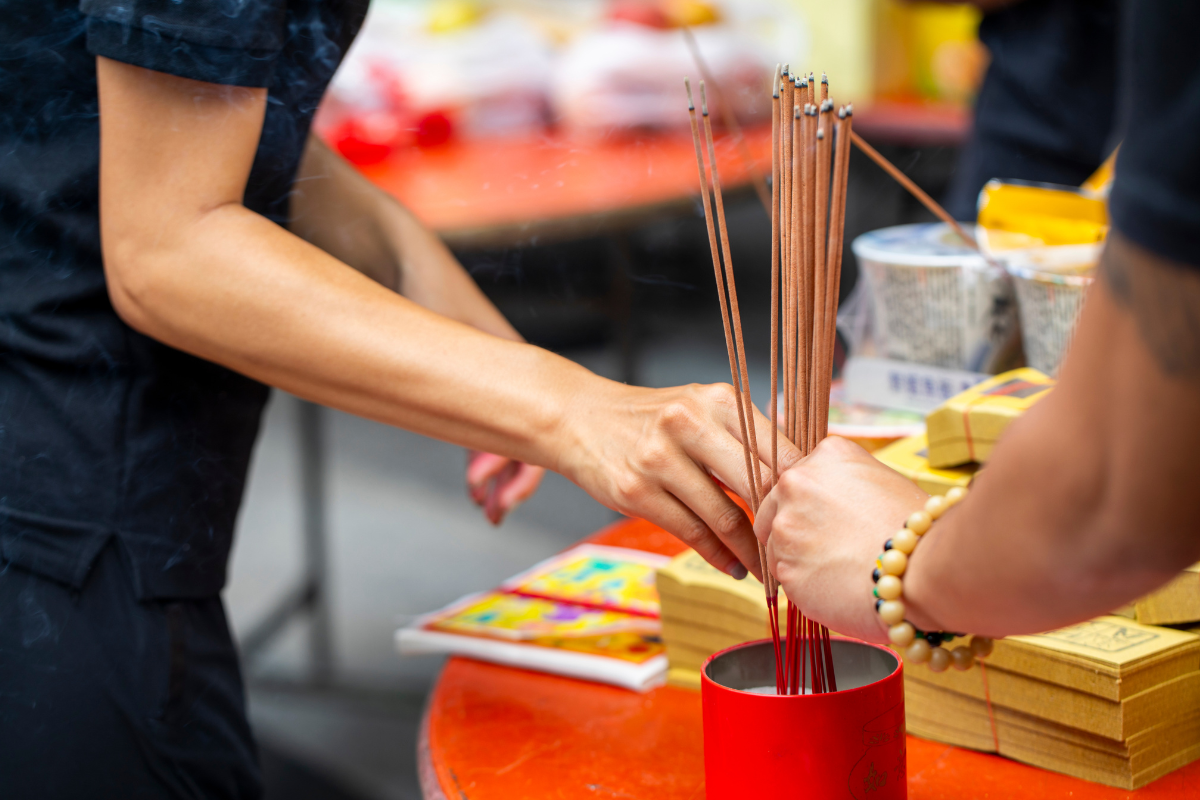Every year, as the seventh lunar month rolls around, Singapore’s streets, temples, and neighbourhoods take on a unique atmosphere. The Hungry Ghost Festival, or Zhongyuan Jie, is a time steeped in tradition, superstition, and cultural rituals, observed across many Asian communities, particularly among the Chinese. Rooted in Taoist and Buddhist beliefs, it is said that during this month, the gates of the underworld open, allowing spirits to roam the living world. Families honour their deceased relatives, offering food, incense, and even theatrical performances to appease these wandering souls.
While the festival is colourful and fascinating to witness, it also comes with a set of cultural etiquette and taboos. In Singapore, where modern life intertwines with rich heritage, observing these customs is a sign of respect for both tradition and the local community. Whether you’re a curious visitor or a local trying to navigate the dos and don’ts, knowing what to avoid can save you from awkward encounters—or worse, from attracting bad luck. Here are 10 things to avoid doing during the Hungry Ghost Festival in Singapore.
- Don’t Shake Hands or Offer Physical Contact to Strangers at Night
One common belief during the festival is that spirits roam more freely after sunset. As such, it is considered risky to make physical contact with unknown individuals during evening hours. While this may sound superstitious, many locals prefer to err on the side of caution. In Singapore, residential areas often light up with lanterns and make offerings on streets or in front of homes. If you are walking past, it is polite to give way and avoid initiating physical contact, particularly with elderly residents or performers.
- Avoid Swimming or Boating at Night
Water has always held a symbolic meaning in Chinese folklore, often serving as a conduit between the living and the dead. During the seventh lunar month, spirits are thought to be drawn to water, increasing the risk of misfortune. In Singapore, this belief has translated into a general avoidance of night-time swimming in pools, rivers, or even local beaches during the festival. While the city’s waters are safe, locals often treat this tradition with respect, opting for early morning or daytime water activities instead.
- Don’t Walk Alone at Night in Unfamiliar Areas
Safety concerns aside, the belief that ghosts wander more freely at night has led to a tradition of avoiding solitary night-time strolls. Many Singaporeans take this seriously, particularly in neighbourhoods where open-air offerings, joss paper, and temporary altars are set up. If you do find yourself walking alone, it’s best to stick to well-lit areas and avoid venturing too close to unoccupied or abandoned buildings, where spirits are traditionally believed to linger.
- Avoid Wearing Red
In Chinese culture, red is a colour associated with joy, luck, and celebration. However, during the Hungry Ghost Festival, wearing red is thought to attract attention from spirits, who might mistake you for someone drawing power or challenging them. In Singapore, this belief is mostly followed by the older generation, but you’ll still notice it influencing temple rituals and community events. Tourists might not need to fully avoid red, but being mindful of this cultural nuance when attending offerings or street performances is considerate.
- Don’t Ignore Offerings and Altars
Throughout Singapore, especially in Chinatown, Geylang, and other culturally significant neighbourhoods, temporary altars are erected to honour the spirits. These may include food, drinks, joss paper (spirit money), and incense. Walking past these altars without a pause, or worse, disturbing them, is considered disrespectful. Local families take pride in their rituals, and interference can be seen as a sign of disrespect. Observing silently and refraining from taking offerings or touching objects is the norm.
- Avoid Loud Arguments or Negative Behaviour
It is widely believed that spirits are drawn to human emotions, particularly anger and sorrow. Engaging in loud arguments, shouting, or displaying aggressive behaviour near residential or ritual areas can invite bad energy. In Singapore, community centres, temples, and even streets may host live opera performances or ritual ceremonies. Participating respectfully—or simply watching quietly—ensures you remain in harmony with the spiritual atmosphere.
- Don’t Participate in the Superstitious Practices if You’re Unfamiliar
Some rituals, such as burning joss paper or food offerings, may seem fascinating to tourists. However, these practices are deeply symbolic, and improper handling can be considered offensive. For instance, joss paper is meant to be burnt safely in designated areas. Picking up food offerings left for spirits is taboo, as it is believed this could anger the ghosts. In Singapore, many temples provide guidance on proper participation—if you’re unsure, it’s better to observe rather than participate.
- Avoid Walking Under Clotheslines or Hanging Laundry at Night
A lesser-known taboo in Singapore during the Hungry Ghost Festival involves laundry. Hanging clothes at night, especially in areas with active offerings or temporary altars, is believed to attract wandering spirits. Similarly, walking under clotheslines is thought to bring bad luck. While modern urban living makes this a minor concern, it is a practice still observed in more traditional neighbourhoods or kampung-style areas, where local families maintain their ancestral customs.
- Don’t Use Umbrellas Indoors or at Night Without Reason
Umbrellas, in traditional Chinese superstition, are linked to shielding oneself from spiritual attention. Opening an umbrella indoors or without a practical reason during the festival is seen as inviting misfortune or disrespecting the spirits. In Singapore, this is more of a symbolic gesture, but some families continue to follow it strictly. Visitors may notice older residents quietly reminding children to avoid unnecessary umbrella use during ritual events.
- Avoid Taking Photographs of Rituals Without Permission
The Hungry Ghost Festival is visually captivating, with intricate altars, vibrant opera performances, and elaborate street offerings. However, snapping photos indiscriminately can be considered disrespectful. Many locals see the rituals as sacred acts of remembrance, not a tourist spectacle. In Singapore, if you wish to photograph the festivities, it is polite to ask for permission, avoid using flash near altars, and respect signs indicating photography restrictions. This ensures a harmonious experience for both participants and observers.
Observing the Festival Respectfully
The Hungry Ghost Festival in Singapore is a rich cultural tapestry, blending traditional beliefs with contemporary urban life. Areas like Chinatown, Geylang Serai, and Bedok are known for their vibrant festivities, including open-air markets, street opera performances, and community rituals. Observing the customs with respect allows both locals and visitors to appreciate the depth of heritage and the importance of family and remembrance in Chinese culture.
Cultural experts often emphasise that many of these taboos are less about instilling fear and more about fostering mindfulness. Dr. Lim Wei Ling, a Singaporean anthropologist, notes, “The rules surrounding the Hungry Ghost Festival teach respect for life, remembrance of ancestors, and awareness of one’s surroundings. Even for those who do not believe in spirits, these practices encourage thoughtfulness and community harmony.”
For tourists, a few practical tips can enhance your experience: stick to well-lit areas after dark, observe performances quietly, and take the opportunity to learn from locals about the meaning behind offerings and rituals. Remember, the essence of the festival lies in respect and remembrance, not just spectacle.
A Festival That Bridges Past and Present

What makes Singapore’s Hungry Ghost Festival unique is the way it blends modern urban living with centuries-old traditions. Temporary altars appear on HDB corridors, opera tents light up void decks, and families continue ancestral rituals amidst bustling city life. While some taboos may seem old-fashioned, they are part of a living culture that honours the past while coexisting with the present.
By understanding and respecting the 10 things to avoid—whether it’s being cautious at night, refraining from disruptive behaviour, or observing offerings with care—you can fully appreciate the festival’s significance. The Hungry Ghost Festival is ultimately about balance: acknowledging the unseen, respecting the departed, and celebrating the continuity of family and community traditions.
In Singapore, this month is not just about superstition; it’s a reminder of the city’s diverse heritage, where modernity and ritual coexist, and where respecting old customs enriches the everyday. For locals and visitors alike, observing the rules is not merely about avoiding bad luck—it is a way of participating in a cultural narrative that has shaped generations and continues to define the rhythms of life in the Lion City.

